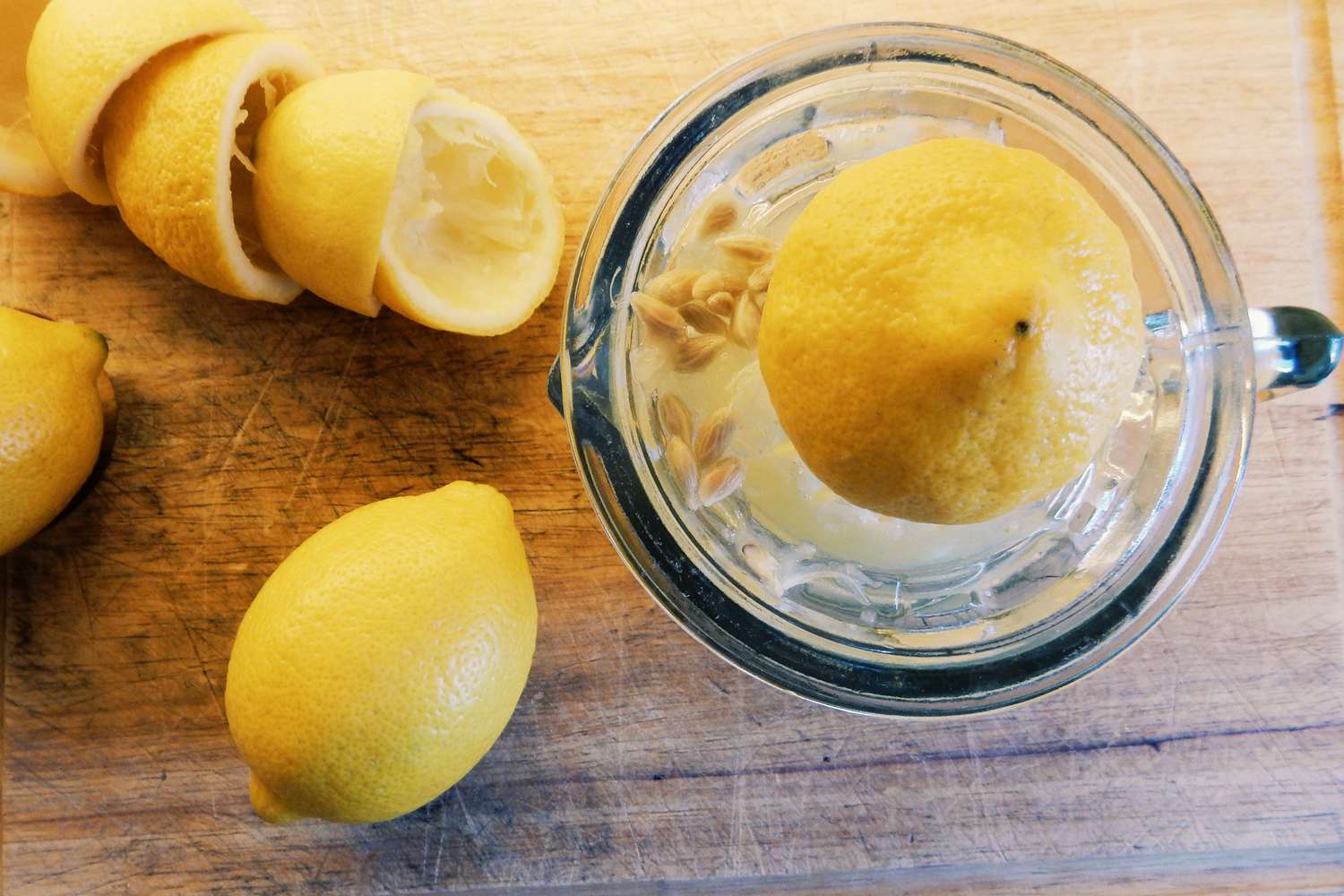3 Best Substitutes for Lemon Juice

Merethe Svarstad Eeg / EyeEm / Getty Images
Lemon juice is like garlic—it is used in a lot of recipes, and it is highly revered for having some health benefits. It is also commonly used in cooking and baking. The bright citrus fruit adds a sour, acidic flavor to both sweet and savory recipes and is an excellent source of vitamin C. Because of this, some people stir lemon juice into their water or tea for a boost of immunity.
Whether incorporating lemon juice into juices or squeezing it on top of savory dishes, lemon juice is a versatile ingredient and a staple in many kitchens. However, it is easy to run out. When an alternative for lemon juice is needed, consider these popular substitutes.
Why Use an Alternative?
Lemon juice is often used as an alternative to other ingredients. For people trying to cut back on calorie-dense foods like salad dressings, lemon juice makes for a great alternative. It is also a substitute for sugar in tea since it adds a bright flavor. However, there may be times where a substitute for lemon juice is necessary.
Allergies are often a good reason to avoid certain ingredients. While citrus allergies are rare, they do exist. Lemons fall under the category of citrus fruits. Citrus allergies have mainly been reported due to the ingestion of oranges, grapefruits, and mandarins. However, allergic reactions to lemons have also been reported, according to the American Academy of Allergy Asthma and Immunology.
Nutritionally, lemon juice can be rich in vitamin C. While vitamin C is an essential nutrient associated with many health benefits, some people may be advised by their healthcare provider to avoid excessive amounts of vitamin C. For example, vitamin C can have interactions with some treatments and medications, such as chemotherapy.
Lemon juice also adds a strong flavor to many dishes. It can be overpowering due to the acidic nature of lemons, making it a more dominant and noticeable flavor in a recipe. Not having lemons or lemon juice on hand to use in a recipe is also a valid reason to seek a substitution.
Lemon Juice Nutrition
This nutrition information for 1 fluid ounce (30.5 grams) of raw lemon juice is provided by the USDA.
- Calories: 27.8
- Fat: 0.073g
- Sodium: 0.305mg
- Carbohydrates: 2.1g
- Fiber: 0.091g
- Sugars: 0.769g
- Protein: 0.107g
- Vitamin C: 11.8mg
Lemon juice is not a significant source of most nutrients because it is usually consumed in small amounts. However, it is a rich source of vitamin C.
Popular Substitutes
The juices of other citrus fruits make for excellent lemon juice substitutes because they are also naturally acidic and usually have a comparable flavor. Other substitutes for lemon juice have a similar tartness and acidity. Because most of these alternatives have a similar consistency to lemon juice, they can be used at a 1:1 ratio in cooking and baking.
Lime Juice
Lemons and limes go hand-in-hand, so they can often be used interchangeably. Like lemons, limes are citrus fruits that are tart and acidic. You can squeeze lime juice at home using a citrus squeezer or even with your hand.
Bottled lime juice is also available at most grocery stores made from concentrate, but fresh lime juice will likely have a brighter flavor. The nutritional differences between lemon juice and lime juice also are insignificant. However, lime juice has slightly more fiber and protein.
Orange Juice
A popular breakfast drink, orange juice is the lemon juice substitute you may already have in your refrigerator. Like lemon juice, it has a noticeable flavor. Orange juice is not as acidic as lemon juice, but it does have a similar tartness that makes it a suitable substitute for lemon juice.
This substitute is ideal for adding to fresh juices, salad dressings, and savory recipes. Nutritionally, orange juice contains more calories and sugar. It is also a greater source of protein, vitamin C, and minerals like potassium and magnesium.
Vinegar
When a small amount of lemon juice is needed, vinegar can be a great substitute. It is tart and acidic like lemon juice. But, it can have an overpowering flavor when used in large amounts. This lemon juice substitute is best for savory recipes.
Like lemon juice, vinegar is consumed in small amounts. Therefore, it is not a significant source of nutrients. However, it contains fewer calories than lemon juice and contains trace amounts of some minerals.
A Word From Verywell
If you are following a recipe that calls for lemon juice but you have run out or want to use another ingredient, you have several options. Juices from other citrus fruits make for the best lemon juice substitutes because they have a similar flavor. Vinegar is also a suitable choice.
When choosing an alternative to lemon juice, be sure to use an ingredient that is tart and acidic like lemon juice. If it is a liquid ingredient, it can likely be used at a 1:1 ratio. When making substitutions, you may need to adjust the quantity as needed.
Citric acid and citrus allergy. American Academy of Allergy Asthma & Immunology.
National Institute of Health, Office of Dietary Supplements. Vitamin C.
USDA, FoodData Central. Lemon juice, raw.
USDA, FoodData Central. Lime juice, raw.
USDA, FoodData Central. Orange juice, no pulp, not fortified, not from concentrate, refrigerated.
USDA, FoodData Central. Vinegar, distilled.
:max_bytes(150000):strip_icc()/Lacey-Bourassa-1000-7e7238164b654c89aa64c712c0b0b194.jpg)
:max_bytes(150000):strip_icc()/unnamed-38aa6879f8b546c3a3ba36ec48bda560.jpeg)
:max_bytes(150000):strip_icc()/Lacey-Bourassa-1000-7e7238164b654c89aa64c712c0b0b194.jpg)
:max_bytes(150000):strip_icc()/GettyImages-953147476-cfe1bc40f0264da3ada00042325f0d39.jpg)
:max_bytes(150000):strip_icc()/GettyImages-1281196664-93c5b7ecb478432293f25f2fa3f617e5.jpg)
:max_bytes(150000):strip_icc()/low-in-sugar-fruits_crop-e7e2361ab34641b4b529df389ce88e34.jpg)
:max_bytes(150000):strip_icc()/GettyImages-909847392-1e2ed1f2c04447f8b4bd039e81642917.jpg)
:max_bytes(150000):strip_icc()/green-juice-bf5f2a0a4397477aa3355d1b25721892.jpg)
:max_bytes(150000):strip_icc()/GettyImages-176562631-73e3644838a34703a5b7036de91981a5.jpeg)
:max_bytes(150000):strip_icc()/GettyImages-455450237-623b32c1faa441c694ddc30054aacc63.jpg)
:max_bytes(150000):strip_icc()/tangerine-crop-3098397fcd5742b1b9c2df0a2cbcbfb9.jpg)
:max_bytes(150000):strip_icc()/GettyImages-1316835598-2779d98046b64081ba2157849bae3e56.jpg)
:max_bytes(150000):strip_icc()/GettyImages-1293605375-56f501d4baec4fbb868a38eb86dd0740.jpg)
:max_bytes(150000):strip_icc()/tangelo-crop-3e8286abb2614bb1a45be49c5fd3abe8.jpg)
:max_bytes(150000):strip_icc()/lemons-crop-3def93a8dda443609ca4f2f7f2183288.jpg)
:max_bytes(150000):strip_icc()/GettyImages-1216754135-b067d9bffd964bfeb5a0174238d5564d.jpg)
:max_bytes(150000):strip_icc()/GettyImages-895989306-f525edd024d0449cb02a04b5f1288d90.jpg)
:max_bytes(150000):strip_icc()/VWFit-salt-replacements-7970874-8c569a23600245cbb85cac38824f3c7a.jpg)
:max_bytes(150000):strip_icc()/GettyImages-635995970-14608e809b2b4604813076f490f8d1e6.jpg)